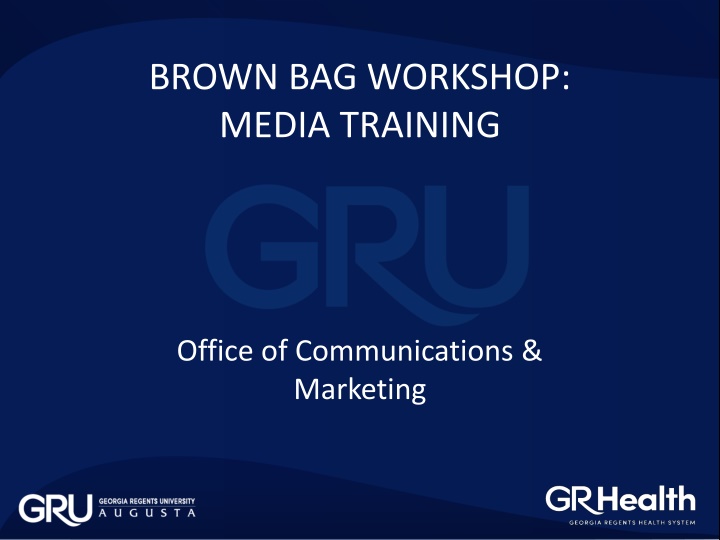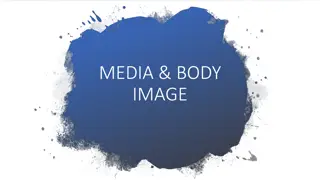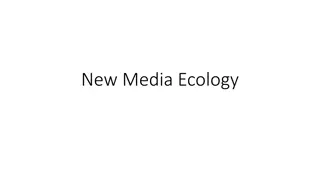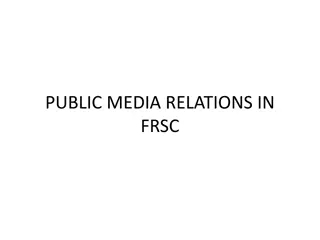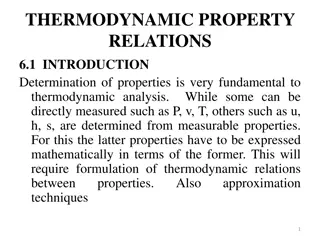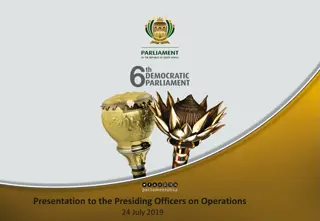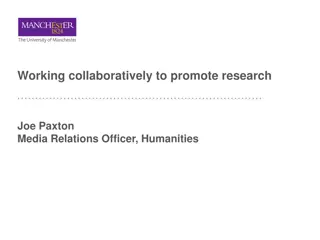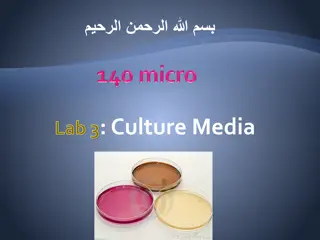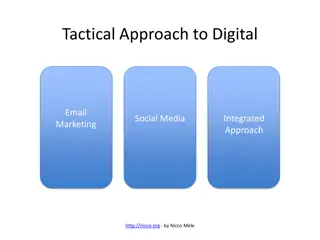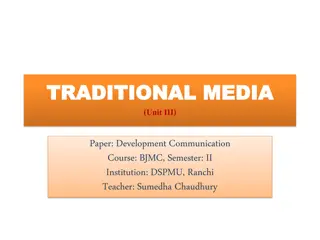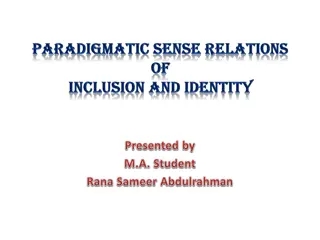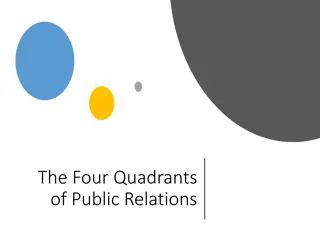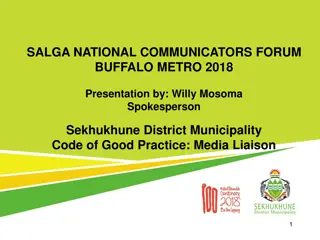Media Relations Workshop Insights
Explore the importance of media training, the evolving media landscape, why working with the media is crucial, the role of media relations, strategies for media exposure, handling reporter interactions, and more. Learn how to navigate the media landscape effectively and enhance your organization's reputation through strategic communication.
Download Presentation

Please find below an Image/Link to download the presentation.
The content on the website is provided AS IS for your information and personal use only. It may not be sold, licensed, or shared on other websites without obtaining consent from the author.If you encounter any issues during the download, it is possible that the publisher has removed the file from their server.
You are allowed to download the files provided on this website for personal or commercial use, subject to the condition that they are used lawfully. All files are the property of their respective owners.
The content on the website is provided AS IS for your information and personal use only. It may not be sold, licensed, or shared on other websites without obtaining consent from the author.
E N D
Presentation Transcript
BROWN BAG WORKSHOP: MEDIA TRAINING Office of Communications & Marketing
Todays media landscape Print/Online New Media (Huffington Post) Television Radio Social Media Blogs Facebook Twitter Pintrest
Where people get news Source: Pew Project for Excellence in Journalism
Why work with the media? Promotion of your scholarship or expertise Contribute to Georgia Regents University and Health System s reputation Tell our story
Why work with Media Relations? We are the spokespersons for the enterprise We have relationships with the media We have experience with traditional and non-traditional media We are knowledgeable about applicable state laws (Open Records Act, Sunshine Law) We vet media requests We advise on appropriate venues and reporters We are trained to handle crisis communications We are former members of the media
Timeliness: Why its important Deadlines are constant Reply to media inquiries as quickly as possible Expert s obligation Helps to develop reporter/expert relationships Media outlets usually work together in which increases your chances of national & international exposure
Media Exposure: How do we get it? Responding to media inquiries Media releases External pitches Op-Eds Established relationships with institutional experts Public Relations Listservs Crises
Roles Interviewer Reporters don t work for us A good reporter is: Balanced/Honest Quick A generalist Curious Interviewee
What to do when a reporter calls you Alert the Media Relations Department before scheduling a time to speak with the media. We will advise on how to proceed and assist in scheduling an interview. We ll ask the questions Identify the media outlet What is the story about? Who else are they talking to? Who is the right expert? What is the deadline? Relax you re the expert, remember?
What to do when a reporter calls you USE LAYMAN S TERMS! Don t dumb down. Lose the jargon Tell it to your mother Know your audience Don t assume any prior knowledge on the reporter s part
Soundbites Realize up front that reporters will use about 10 seconds of what you say Analogies and visual examples work well Arm yourself with some keepers about your area of expertise Dull: Premature babies don t have enough surfactant and may benefit from an endotracheal tube Keeper: When babies are born premature, the sacs in their lungs stick together when they breathe in and out. By providing a natural lubricant, through a tube in their airway, we can fix that problem.
Bridging Know in advance what you are going to talk about and LISTEN CAREFULLY to questions Find a way back to the point you want to make Expand or narrow the scope of the question Do not speculate. If you don t know the answer, say so. Do not repeat false statements or toxic wording
Dont expect To receive a list of questions prior to the interview To approve the reporter s story ahead of time, but you can offer to be available to fact-check To tell the reporter what he or she should write about The headline to reflect the content of the story
On Camera Appearance Clothing & Makeup No sunglasses No striped, checkered, plaid, or big prints Consider storing an extra jacket/tie in the office Women, wear more makeup than you typically do Physical Speak to the reporter (taped) Speak to the camera (live) Avoid crazy eyes Avoid swivel chairs Sit up straight puppet on a string
Dressing for TV Women Bright, flattering colors Minimal jewelry Flattering makeup Professional look Avoid busy patterns Men Conservative colors Blue dress shirt Professional look No busy patterns Shave
Quick Tips Stand if you re talking on the phone it prevents multi-tasking, improves your breathing and you think better on your feet NOTHING IS OFF THE RECORD! Try to avoid No Comment You can limit the time of the interview
Media Relations Contacts Christen Carter, Director chrcarter@gru.edu 706-721-5733 Toni Baker, Medical College of Georgia tbaker@gru.edu 706-721-4421 Danielle Harris, Hull College of Business, College of Education, & College of Math and Sciences deharris1@gru.edu 706-446-4805 Denise Parrish, Clinical Affairs: Georgia Regents Medical Center and Children s Hospital of Georgia mparrish@gru.edu 706-721-9566 LaTina Emerson, College of Dental Medicine, College of Nursing, and College of Arts, Humanities, & Social Sciences lemerson@gru.edu 706-721-4706 Jennifer Scott, Medical College of Georgia (student news), Research, and University Partnerships jscott1@gru.edu 706-721-8604 Steven Uhles, Cancer Center suhles@gru.edu 706-721-2335 Sharron Walls, College of Allied Health Sciences shwalls@gru.edu 706-721-7955 GRU Paging Operator 706-721-3893 The operator will direct you to the on-call media relations representative (24/7)
